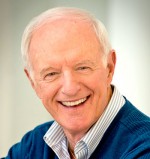Column Name
Title
Two of the things you should know about Robert C. White Jr.: he can’t imagine not teaching—but if he weren’t, he’d probably be cooking—and he goes by Doc to avoid confusion with the other Robert White on the Voice faculty.
Body
Born in Trenton, N.J., Doc grew up across the Delaware River in Bucks County, Pa. He received a bachelor’s in music education from Susquehanna University, and a master’s in music and doctorate in voice pedagogy from Columbia University. His extensive teaching career began with a junior high position in South Bloomfield, N.J. (teaching music and voice and directing three choirs); followed by two years at the Third Army Band Training Unit at Fort Jackson, S.C. (teaching instrumental music, mostly woodwinds); and a couple of years at Flagstaff (Ariz.) High School (leading six performing choirs plus producing and directing the annual musical). Doc’s career became less peripatetic when he joined the music faculty at Queens College, where he worked from 1966 to 1998 (he directed two choirs, taught studio voice and related vocal courses, and worked with doctoral students). Along the way he also taught at Mannes College and is currently on the faculties of New York University, the CUNY Graduate Center, the Lindemann Young Artist Program of the Metropolitan Opera, and, since 2006, Juilliard, where he teaches studio voice. Doc and his longtime partner David Ruderman got married last year and live in Manhattan.
When did you first know you wanted to be a musician?
I grew up in a working-class family, but my grandmother had insisted that all six of her children take piano lessons. Four of my aunts played rather well, and my best memories were Sunday nights at my grandmother’s house standing around the piano and singing. Everyone in the family had a decent voice. (We didn’t buy recordings of the songs of the day; we bought the sheet music). Since I never wanted the music to stop, I had to learn to play the piano so that I could take over when my aunts got tired.
Who was the teacher or mentor who most inspired you?
My strongest influence was Horace Hutchison, my public school music teacher from K through 12. He directed the choirs, band, and orchestra; taught theory and music appreciation; and I took piano lessons from him. I learned everything from him. I also had an English teacher in junior high school, Margaret Watkins, from whom I gained a lifelong appreciation of literature, and an art teacher, Patrick Boyd who taught me how to look at painting, sculpture, and architecture and was the reason I’ve haunted museums for the past 60 years.
What’s the first recording you remember?
I don’t remember the recording, but I do remember the first Haydn sonata my piano teacher assigned to me. I was totally hooked on classical music from that moment onward. I also remember the first operatic aria I heard at a live concert for young people. It was Figaro’s Largo al factotum, and I thought the falsetto was hilarious.
What’s the most embarrassing performing you’ve had?
Guest conducting a 200-voice festival chorus rehearsal with my fly noticeably open! Fortunately, I was wearing black underwear.
If you could have your students visit any place in the world, where would it be?
Probably Machu Picchu, Peru, because it’s incredibly beautiful and if the Incas could literally build a city on a virtually inaccessible mountain top, my students should not be discouraged by a few unsuccessful auditions.
How has your teaching changed over the years?
Although one of my first students became a professional singer way back in 1966, I think my teaching has changed most by being aware of the realities of today’s professional world and all of its demands. Also, my teaching changed when I gave up accompanying my lessons and started using collaborative pianists.
What is the most important thing you hope your students remember?
That’s easy: to breathe low and to use their whole bodies to support, and thus release, whatever voice they’ve inherited.
What are your nonmusic interests or hobbies?
Cooking (French and Italian food especially), gardening, reading, and art films.
What would people be surprised to know about you?
That I made my debut as a professional actor at the age of 16 in a summer stock company in Bucks County, Pa. The parts were very small.
What are your favorite and least favorite things about New York City?
My favorite thing is the wonderful frustration of never being able to see every play, every concert, every ballet, and every art exhibition that the city offers. What you can see is glorious. I also love New York’s racial and cultural diversity. My least favorite thing is New York’s population density, but without it we wouldn’t have all the above cultural offerings.
What are you reading, listening to, and/or watching?
I am currently reading two biographies, one of Alexander Hamilton and another of Aaron Burr, which is probably indicative of my split personality. I am listening to and studying Benjamin Britten’s War Requiem, because I think it is one of the great works of the 20th century, and it literally moves me to tears. I don’t watch much television except for Turner Classic Movies. I love the ’30s and ’40s.
Congratulations on getting married. Has life changed since you tied the knot?
David and I were married on the 12th anniversary of the day we met, so it hasn’t changed that much. At least now, however, we don’t need to worry about hospital visitation rights, inheritance, etc. The best thing is that he recently finished his national certification in geriatric physical therapy—just in time!





